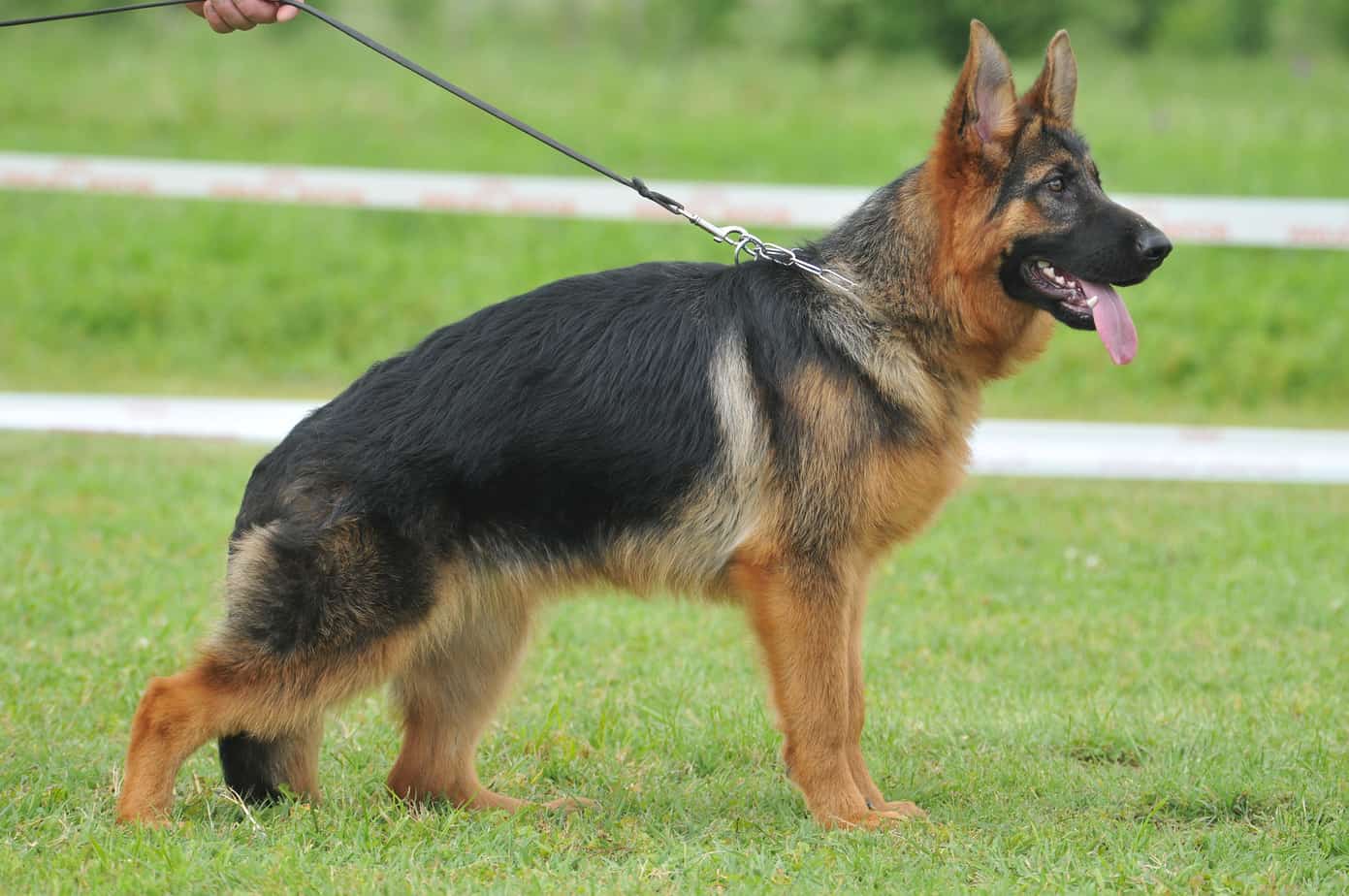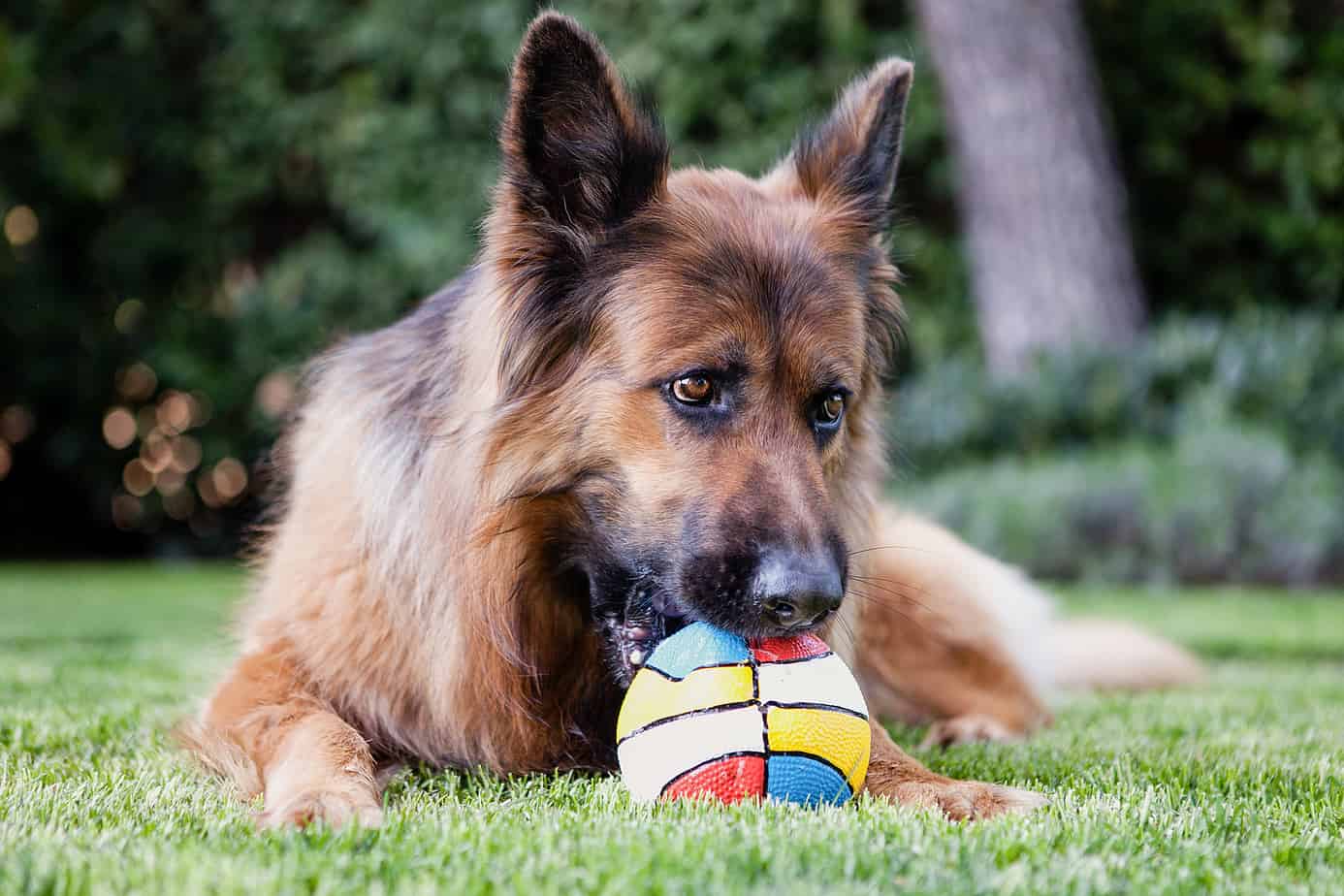German Shepherds are a very versatile breed. They have been used for decades for herding, tracking, police work and even military work in wars. Are they trained by experts because they are hard to train? Or are these versatile dogs easy to train?
Are German Shepherds hard to train? No, German Shepherds are very easy to train, and are a very loyal, responsive breed that love to please their owner. They make great family pets and are one of the best guard dog breeds you can have.
German Shepherds may be easy to train, but you need to start early and be consistent with training. It’s best to start training in the first two to three months of the puppy’s life before he can pick up any bad habits. Building a bond, by teaching some simple commands will make it much easier to teach him more complicated commands when he gets bigger.
Why Are German Shepherds Easy To Train?
German Shepherds are very intelligent dogs, and love to learn new tricks and commands.
Adult German Shepherds are large, strong, athletic dogs. They can weigh anywhere from 25 to 40kg and usually grow to between 50 to 65cm in height. Even if your German Shepherd is not going to become a working/service dog, it’s vital to teach some basic commands so that you can control him when out and about.
Here’s a great video that includes a few tips for training a German Shepherd puppy:
How does the German Shepherd rate on the dog intelligence test? The dog intelligence test is based on a dog’s willingness to work with people. Some dogs are labeled “stubborn” and thus don’t rank as high on the dog intelligence scale.
However, some dogs were bred to work closely with people and are more eager-to-please. These are the breeds that rank higher on the scale of intelligence. Some breeds were bred to work more independently of humans and they are typically the “stubborn” dogs that are lower on the scale. However, these breeds are amazing at what they were bred to do.
Essentially, the dog intelligence scale is not about intelligence at all, but trainability. The higher the dog rates on the scale the easier he is to train. So, where does the German Shepard sit on the dog intelligence scale?
German Shepherds rate in the top three, surpassed only by the Poodle and Border Collie.
This means that a German Shepherd can learn a new command in 1-10 repetitions and obey the first command 95% of the time or better.
So clearly, the German Shepherd is a very trainable breed.

Now, it is important to note that all dogs are individuals. Even if the breed as a whole, ranks as being very trainable, dog trainability within that breed may can vary. There are a lot of things that can contribute to the trainability of a dog including breeding, diet, lifestyle, training technique, and the motivation that you are using.
Is it Important to Socialize A German Shepherd?
Socialization is the most important aspect of training that you will want to work on with a new puppy.
It is especially important with larger breeds. If a chihuahua is on a leash and is lunging and snapping at you, it’s almost funny. But if it’s a German Shepherd lunging and snapping, then it’s not so funny.
Socialization is getting your dog used to all sorts of people, places, sounds, sights, smells, animals, surfaces, being touched. To socializatize a dog well, the dog must not only experience these things but also have a positive experience with them.
Here is an example. A black labrador retriever was not well socialized as a puppy. He was raised in a home that was completely carpeted, living room, kitchen, bathrooms, everywhere! Everything was carpet. He was not brought for walks outside, or even taught to walk on a leash. The owners move house with the now adult labrador dog, to a home with wooden floors. The dog will not walk on the floors. The owners can’t even get the dog to cross the threshold!
Now if the owners had socialized their dog with different types of flooring he would not be freaking out now. This may seem like a silly example but it can happen. Change the floor scenario to a pup who never experienced men, children, the sound of a train, pet rabbits, or having their paws touched. When the pup eventually meets this new thing, he may not respond well.
Socialization is key to a well-adjusted adult dog, regardless of size or breed. Socialization starts with the breeder, so be sure to ask your potential breeder about their socialization practices. Socialization is a life long aspect of training, constantly moving your dog and you out of your comfort zone. Ultimately this builds a strong bond and an exciting life for you and your best friend.
How To Train Your German Shepherd
It is a great idea to enroll your German Shepard puppy in a training class! This can be a great way to do some socialization as well as learn some fun things. But keep the following in mind.
Be sure that the instructor uses positive training methods. This could be lure reward training, clicker training, or any other method that rewards the dog for doing something that you want him to do. You do not want an instructor who uses force, harsh words, or punishment of any kind.
Never use choke chains, prong collars, shock collars, or any other form of punishment. Not only are these methods potentially hazardous to your dog’s health (hypothyroidism is a real concern from anything on the neck) but it will definitely damage the bond between you and your dog.
So, we know that the German Shepherd is eager-to-please and catches on to training quickly. It only takes 1-10 reps for them to catch on to a new command. This is great! However, it could mean that the dog will get bored easily in a training class. If the instructor demonstrates a new command and then wants you to teach it to your dog for the next 20 minutes… well your German Shepherd will be bored and going bonkers.

So, be sure to keep things interesting. If your dog knows more commands, intermix them with the new command so he won’t get so bored. Bring a variety of treats so he won’t be bored with the same old treats. Try using a toy and a game of tug as a reward instead of treats. These are all great ways to keep things fresh. You could also try changing your position, try doing training sitting on a chair, sitting on the floor, standing, crouching, or even laying down!
Remember training with consistency and positivity are key to your training success.
Can Training help to stop a German Shepherd Misbehaving?
The root of most misbehavior in dogs is boredom.
I don’t care if you have a highly active border collie or lethargic bulldog, if they act up it’s likely that they are bored.
So, how can you keep your German Shepherd engaged and happy? Plenty of exercises. A tired dog is a good dog. Daily walks, play sessions, and mental training are all excellent options.
These dogs do have a lot of energy so they do well with a job. Training your German Shepherd for agility, herding, tracking, obedience, they even have dog triathlons! These are just a few of the many options for you and your dog.
You could also just train the dog to help you around the house. Turn on and off light switches, open and close doors, fetch the mail, get you the remotes, etc. There are lots of tasks that can keep your dog occupied in your home, too.
Another option is to not feed your dog from a bowl. Put his food in kongs and hide them around the house so he has to find them. This can be very mentally stimulating for a dog and burn a lot of energy. Of course, don’t hide the stuffed kongs anywhere that can be destroyed easily.
can diet affect a German Shepherd’s behaviour?
If you got your German Shepherd from a good breeder and you have done all the training, all exercise, and all the socialization and he is still acting up, you might want to consider his diet. A poor-quality diet can cause a great deal of inflammation, hormonal imbalance, and even neurological disorders.
Thankfully, changing diet is a relatively easy fix. Excessive starches, grains, sugars, and carbs are not good for your dog, yet these are the main ingredients of most dry dog foods.
These carbs can be very inflammatory in a dog’s body. This inflammation can cause, not only, an assortment of health problems, but also neurological problems and misbehavior.
If you dog is not doing well on a dry food diet, then a raw food diet may help. This type of diet typically causes the least inflammation and has the greatest health benefits. Plus, feeding your dog raw meaty bones is great for both mental and physical stimulation.
You can easily conduct an elimination diet when feeding raw food as well. This can help you determine if your dog has a sensitivity to any particular protein or ingredient. If he has a sensitivity, eliminating that from his diet can help to reduce inflammation even more.
How hard is a german Shepherd to train?
German Shepherds are in the top three when it comes to dog trainability. They are willing to work hard for you. They can learn new commands in as little as 1-10 repetitions. These dogs should not be hard to train if you use consistency, patience, and positivity.
The training of a German Shepherd should start with socialization. Socialization should be continued thought the life of the dog. This increases the dog’s comfort in all situations and his bond with you.
Enrolling your dog in a positive reinforcement puppy class with lots of opportunities for socialization is a wonderful idea. This can be a great way to open communication with your puppy and give him lots of fun playtime with other puppies and people. Be sure to pick a trainer who uses only positive methods and never encourages anyone to punish or harm a dog.
Giving your dog plenty to do is important for keeping a German Shepherd happy and healthy. Making sure that he doesn’t have the opportunity to get bored ensures that he won’t misbehave. Be sure to give him plenty of exercise, training, playtime, and fun adventures.
Finally, make sure that you feed your dog a species-appropriate diet. This reduces overall inflammation which reduces his risk of disease and misbehavior. Feeding a varied, species-appropriate diet will also provide mental and physical stimulation.
Sources
https://www.shepped.com/most-common-training-mistakes/
https://gsdca.org/german-shepherd-dogs/training-puppy-tips
https://wagwalking.com/behavior/why-are-german-shepherds-easy-to-train





